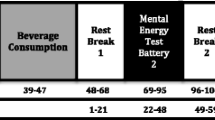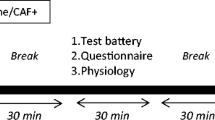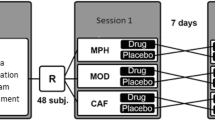Abstract
The objective of this study was to evaluate the effects of low doses (75 mg and 150 mg) of caffeine on mood and cognition in healthy people, with minimal abstinence of 1 hr from caffeine. Improvements were obtained in cognition for attention, problem solving and delayed recall, but not immediate recall or working memory, but performance in the placebo condition was close to the maximum, giving little margin for improvement. For mood, there were statistically significant increase in clearheadedness, happiness and calmness and decreases in tenseness. These mood and performance-enhancing effects of caffeine cannot be seen as representing an alleviation of deficits induced by caffeine abstinence, because there was only minimal deprivation from caffeine.
Similar content being viewed by others
References
Baddeley AD (1968) A three-minute reasoning test based on grammatical transformation. Psychonom Sci 10:341–342
Bättig K, Buzzi R (1986) Effect of coffee on the speed of subject-paced rapid information processing. Neuropsychobiology 16:126–130
Bättig K, Buzzi R, Martin JR, Feierabend JM (1984) The effects of caffeine on physiological functions and mental performance. Experientia 40:1218–1223
Battig WF, Montague WE (1969) Category norms for verbal items in 56 categories: a replication and extension of the connecticut category norms. J Exp Psychol 80:1–46
Bond A, Lader MH (1974) The use of analogue scales in rating subjective feedlings. Br J Med Psychol 47:211–218
Cines BM, Rozin P (1982) Some aspects of the liking for hot coffee and coffee flavor. Appetite 3:23–34
Clubley M, Bye CE, Henson TA, Peck AW, Riddington CJ (1979) Effects of caffeine and cyclizine alone and in combination on human performance, subjective effects and EEG activity. Br J Clin Pharmacol 7:157–163
Colorado Concreteness and Imagery Norms Program on cognitive factors in Human Learning and Memory (1973) Report GBE 10, University of Colorado
Cox BD, Blaxter M, Buckle ALJ, Fenner NP, Golding JF, Gore M, Huppert FA, Nickson J, Roth M, Stark J, Wadsworth MEJ, Whichelow M (1987) The health and lifestyle survey. The Health Promotion Research Trust, London
Dews P, Grice HC, Neims A, Wilson J, Wurtman RJ (1984) Report of Fourth International Caffeine Workshop, Athens, 1982. Chem Toxical 22:163–169
Frewer LJ, Lader MH (1991) The effects of caffeine on two computerised tests of attention and vigilance. Hum Psychopharmacol 6:119–128
Goldstein A, Kaizer S (1969) Psychotropic effects of caffeine in man, III. A questionnaire survey of coffee drinking and its effects on a group of housewives. Clin Pharmacol Ther 10:477–488
Goldstein A, Kaizer S, Whitby O (1969) Psychotropic effects of caffeine in man. IV. Quantitative and qualitative differences associated with habituation to coffee. Clin Pharmacol Ther 10:489–487
Griffiths RR, Woodson PP (1988) Caffeine physical dependence: a review of human and laboratory animal studies. Psychopharmacology 94:437–451
Hasenfratz M, Bättig K (1992) Action profiles of smoking and caffeine: Stroop effect, EEG and peripheral physiology. Pharmacol Biochem Behav 42:155–161
Humphreys MS, Revelle W (1984) Personality, motivation, and performance: a theory of the relationship between individual differences and information processing. Psychol Rev 91:153–184
James JE (1991) Caffeine and health. Academic Press, London
James JE (1994) Does caffeine enhance or merely restore degraded psychomotor performance? Neuropsychobiology 30:124–125
Jarvis MJ (1993) Does caffeine intake enhance absolute levels of cognitive performance? Psychopharmacology 110:45–52
Kerr JS, Sherwood N, Hindmarch I (1991) Separate and combined effects of the social drugs on psychomotor performance. Psychopharmacology 104:113–119
Koelega H (1993) Stimulant drugs and vigilance performance: a review. Psychopharmacology 111:1–16
Kucera H, Francis W (1967) A computational analysis of present-day American English. Brown University Press, Providence, R.I.
Lieberman HR, Wurtman RJ, Emde GG, Roberts C, Coviella ILG (1987) Effects of low doses of caffeine on human performance and mood. Psychopharmacology 92:308–312
Lorist MM, Snel J, Kok A (1994) Influence of caffeine on information processing stages in well rested and fatigued subjects. Psychopharmacology 113:411–421
McNair DM, Lorr M, Droppleman LF (1971) Profile of mood states manual. Educational and Industrial Testing Services, San Diego
Morris RG, Evenden JL, Shakian BJ, Robbins TW (1987) Computer-aided assessment of dementia: comparative studies of neuropsychological deficits in Alzheimer-type dementia and Parkinson's disease. In: Stahl SM, Iversen SD, Goodman EC (eds) Cognitive neurochemistry. Oxford University Press, Oxford, pp 21–36
Parrott AC, Winder G (1989) Nicotine chewing gum (2 mg, 4 mg) and cigarette smoking: comparative effects upon vigilance and heart rate. Psychopharmacology 97:257–261
Rainnie DG, Grunze HCR, McCarley RW, Greene RW (1994) Adenosine inhibition of masopontine cholinergic neurons: implications for EEG arousal. Science 263:689–692
Rall TW (1990) Methylxanthines. In: Gilman AG, Rall TW, Nies AS, Taylor P (eds) The pharmacological basis of therapeutics, 8th edn. Pergamon, New York
Roache JD, Griffiths RR (1987) Interactions of diazepam and caffeine: behavioral and subjective dose effects in humans. Pharmacol Biochem Behav 26:801–812
Silverman K, Evans SM, Strain EC, Griffiths R (1992) Withdrawal syndrome after the double-blind cessation of caffeine consumption. N Engl J Med 327:1109–1114
Smith AP, Rusted JM, Eaton-Williams P, Savory M, Leathwood P (1990) Effects of caffeine given before or after lunch on sustained attention. Neuropsychobiology 23:160–163
Smith AP, Brockman P, Flynn R, Maben A, Thomas M (1993a) Investigation of the effects of coffee on alertness and performance during the day and night. Neuropsychobiology 27:217–223
Smith AP, Maben A, Brockman P (1993b) The effects of caffeine and evening meals on sleep and performance, mood and cardiovascular functioning the following day. J Psychopharmacol 7:203–206
Smith AP, Maben A, Brockman P (1994) Effects of evening meals and caffeine on cognitive performance, mood and cardiovascular functioning. Appetite 22:57–65
Svensson E, Persson L, Sjoberg L (1980) Mood effects of diazepam and caffeine. Psychopharmacology 67:73–80
Swift CG, Tiplady B (1988) The effects of age on the response to caffeine. Psychopharmacology 94:29–31
Terry WS, Anthony SG (1980) Arousal and short-term memory: effects of caffeine and trial spacing on delayed-alternation performance. Anim Learn Behav 8:368–374
Warburton DM (1989) The functional use of nicotine. In: Wald N, Froggatt P (eds) Nicotine, smoking and the low tar programme, Oxford University Press, Oxford, pp 182–199
Warburton DM, Revell A, Walters AC (1989) Nicotine as a resource. in: Rand MJ, Thurau K (eds) The pharmacology of nicotine. IRL Press, Oxford, pp 359–373
Warburton DM, Rusted JM (1993) Cholinergic control of cognitive resources. Neuropsychobiology 28:43–46
Wesnes K, Warburton DM (1983) The effects of smoking on rapid information processing performance. Neuropsychobiology 9:223–229
Wesnes K, Warburton DM (1984a) The effects of cigarettes of varying yield on rapid information processing performance. Psychopharmacology 82:338–342
Wesnes K, Warburton DM (1984b) Effects of scopolamine and nicotine on human rapid information processing performance. Psychopharmacology 82:147–150
Zwyghuizen-Doorenbos A, Roehrs TA, Lipschutz L, Timms V, Roth T (1990) The effects of caffeine on alertness. Psychopharmacology 100:36–39
Author information
Authors and Affiliations
Rights and permissions
About this article
Cite this article
Warburton, D.M. Effects of caffeine on cognition and mood without caffeine abstinence. Psychopharmacology 119, 66–70 (1995). https://doi.org/10.1007/BF02246055
Received:
Revised:
Issue Date:
DOI: https://doi.org/10.1007/BF02246055




